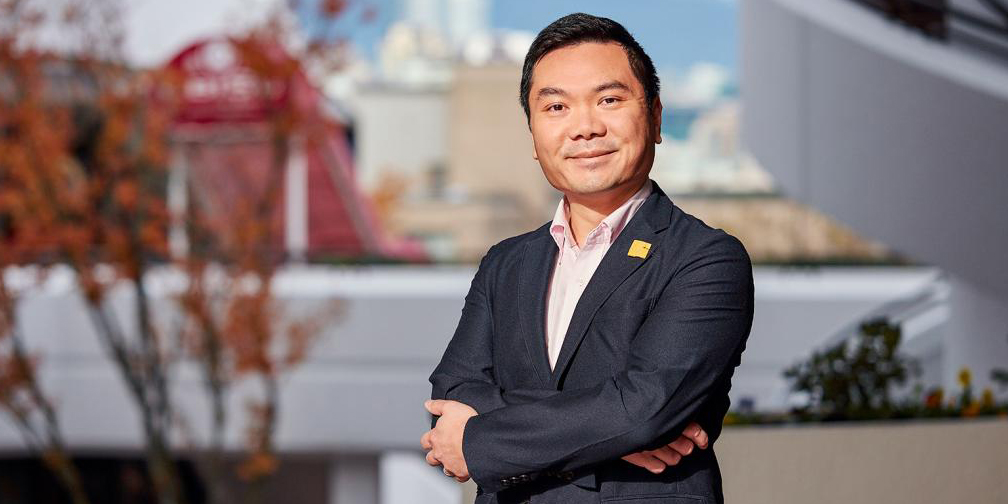Bringing a community together to tackle youth mental health challenges
November 28, 2019

People who visit Maple Ridge, BC, often come to salmon fish in the Fraser River or to hike the 100 kilometres of trails. But when Dr. Matthew Chow first visited the Greater Vancouver suburb in 2015, his reasons were more serious than scenic.
“Young adults in Maple Ridge were heavily involved in, and dying from, substance use, and then a bomb hit them because fentanyl washed ashore. It was one of those slow-, but then fast-moving middle-class kinds of emergencies.” — Dr. Matthew Chow, child psychiatrist
Fentanyl wasn’t the only threat to the community’s health. Maple Ridge’s population was growing rapidly, and a shortage of local family doctors was leaving young people facing mental health issues with no place to turn.
A local psychiatrist had heard about Dr. Chow’s reputation for creating innovative youth health programs, such as a telepsychiatry outreach service at BC Children’s Hospital. She cold-called him and asked if he’d be willing to help.
“Maple Ridge was a microcosm of all these different social and medical ills that face Canada today,” says Dr. Chow. “I thought if we can figure out how to help this community, we can help anybody.”
Yet with very little provincial funding, it was a challenge.
Dr. Chow joined a small team of local family physicians who had identified the crisis. Initially, they imagined a clinic with counselling staff and consultants — a mirror of the mental health services offered in downtown Vancouver. But the youth and their families wanted something different: a youth-friendly drop-in clinic, with peer counselling and patient navigators to help them understand the health system.
So Dr. Chow and his colleagues changed their approach, reaching out to community agencies, schools, the municipal government and even the RCMP to create a Youth Wellness Centre the community could be proud of.
“If we build something from the ground up and it’s grassroots,” he explains, “then the people involved in it will be there for the long run.”
The centre started small, operating out of one family doctor’s office on weekends, by appointment only. Slowly, as people in Maple Ridge began talking more openly about mental health, support for the clinic grew.
The city offered space at an existing downtown youth centre, and the RCMP let Dr. Chow use their office at the youth centre for his patients. Even kids at the local elementary school chipped in, holding bake sales to raise money for the clinic.
With this support and the commitment of local physicians, they added a Thursday night drop-in clinic and expanded into daytime hours on weekdays.
Dr. Chow made the 42-kilometre drive from Vancouver to see clinic patients every Saturday for nearly two years.
“Those two years were among the happiest in my career, because I really felt I was making a difference for people,” he says.
Whether treating a young person for depression, anxiety or substance use, Dr. Chow would develop a treatment plan with community partners, recommending a youth mindfulness program at the YMCA or referring the patient to counselling services.
He had the patient’s family doctor email him if they weren’t getting better and encouraged the school to send progress reports about supports a child might need — relationships he believes wouldn’t have been possible in the traditional health care system.
“If we hadn’t been integrated, we would have created a stand-alone clinic that would be a very nice part of the health care system, but it wouldn’t be part of the community,” Dr. Chow says. “We‘ve reduced the number of suicides, we’re getting kids into addictions and substance use programs and treating them early so they don’t end up in crisis — that’s the difference we’re making.”
That success didn’t go unnoticed. In 2017, the BC government awarded Maple Ridge one of BC’s Foundry Centres: provincially funded hubs for mental health services for young people aged 12 to 24 years. In January 2020, Maple Ridge’s new 6,000 sq. ft. youth centre and clinic will open its doors in a nearby commercial development.
The province has also announced the city will be among the first in BC to have an integrated school-based model of care for mental health.
For Dr. Chow, the attention and resources being showered on Maple Ridge are remarkable.
“I have to believe it’s because of our story and how we got to where we are today that the government was willing to invest in the community,” he says. “The local physician community saw the crisis, the opportunity, and rallied everyone to fix this.”
Though he’d like to continue to contribute at the new clinic, Dr. Chow may not have the bandwidth once he takes on the presidency of Doctors of BC in June 2020.
He says the challenge ahead for Maple Ridge will be to ensure the new Foundry model of care doesn’t turn into that conventional health system they tried so hard to avoid.
“I’m optimistic we’ll make it work,” Dr. Chow says. “Will there be speed bumps? Yes. Turbulence? Yes. But I think because of the mutual trust and respect, we can pull this together and be an example to others.”
The opinions stated by Physician Changemakers are made in a personal capacity and do not reflect those of the Canadian Medical Association and its subsidiaries.
